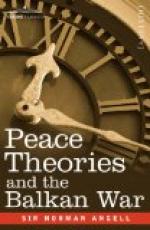as distinct from South America, by a general agreement
not to resort to force, so it is the English method
in the international field which gives better
results than that based on force. The relationship
of Great Britain to Canada or Australia is preferable
to the relationship of Russia to Finland or Poland,
or Germany to Alsace-Lorraine. The five nations
of the British Empire have, by agreement, abandoned
the use of force as between themselves.
Australia may do us an injury—exclude our
subjects, English or Indian, and expose them
to insult—but we know very well that
force will not be used against her. To withhold
such force is the basis of the relationship of
these five nations; and, given a corresponding
development of ideas, might equally well be the basis
of the relationship of fifteen—about
all the nations of the world who could possibly
fight. The difficulties Mr. Chesterton imagines—an
international tribunal deciding in favour of Austria
concerning the recession of Venice and Lombardy,
and summoning the forces of United Europe to
coerce Italy into submission—are, of course,
based on the assumption that a United Europe, having
arrived at such understanding as to be able to
sink its differences, would be the same kind
of Europe that it is now, or was a generation
ago. If European statecraft advances sufficiently
to surrender the use of force against neighbouring
states, it will have advanced sufficiently to
surrender the use of force against unwilling
provinces, as in some measure British statesmanship
has already done. To raise the difficulty
that Mr. Chesterton does is much the same as
assuming that a court of law in San Domingo or Turkey
will give the same results as a court of law in Great
Britain, because the form of the mechanism is
the same. And does Mr. Chesterton suggest
that the war system settles these matters to perfection?
That it has worked satisfactorily in Ireland and Finland,
or, for the matter of that, in Albania or Macedonia?
For if Mr. Chesterton urges that killing and being killed is the way to determine the best means of governing a country, it is his business to defend the Turk, who has adopted that principle during four hundred years, not the Christians, who want to bring that method to an end and adopt another. And I would ask no better example of the utter failure of the principles that I combat and Mr. Chesterton defends than their failure in the Balkan Peninsula.
This war is due to the vile character of Turkish rule, and the Turk’s rule is vile because it is based on the sword. Like Mr. Chesterton (and our pirate), the Turk believes in the right of conquest, “the ultimate test of how they fight.” “The history of the Turks,” says Sir Charles Elliott, “is almost exclusively a catalogue of battles.” He has lived (for the most gloriously uneconomic person has to live, to follow a trade of some sort, even if it be that of theft) on tribute exacted from the Christian populations, and extorted,




